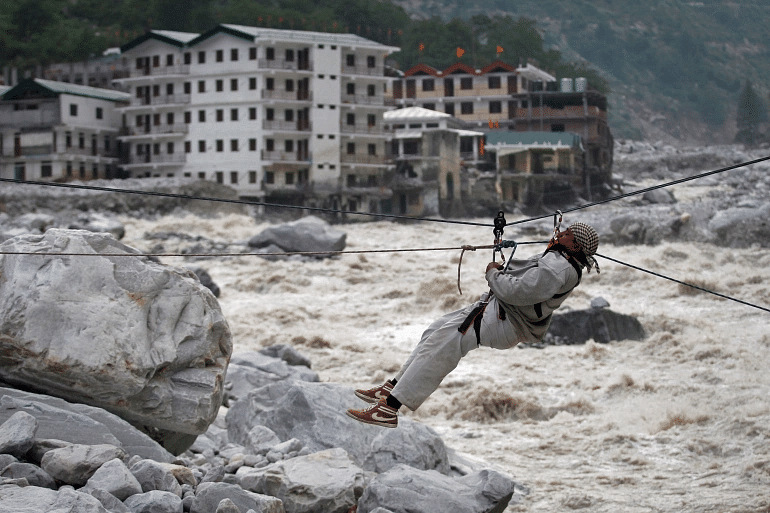The Uttarakhand glacier burst and the resulting flash floods have caused widespread loss of life. They have also disastrously impacted infrastructure works on some rivers. This natural disaster’s exact and immediate cause will be ascertained by experts but ultimately it can be traced to climate change which has, over many decades, begun to shrink the glaciers in the upper reaches of the Himalayas. This grim happening is one more reminder that humankind is simply not addressing the problem of climate change with the urgency and seriousness it deserves.
This conclusion is inescapable for year after year, more and more, instances of extreme weather are taking place. Fundamental changes in the ecology of the planet are occurring bringing misery to peoples the world over. Climate scientists in study after study are pointing to dangers of the global warning caused by human activity. They are cautioning global decision makers that unless urgent action is taken a tipping point may be reached which will inevitably bring negative and unpredictable social, political and economic results. These may alter not only world order but human life as we know it.
To contain these developments before it is too late an international consensus is needed and then implemented. This is far from the case for not only is there insufficient political will there is also insufficient acceptance of scientific logic and estimations. This is so not only among the ignorant but also among leaders who should know better. The example of Donald Trump comes to mind. His basic instinct was to dismiss climate change as mumbo-jumbo despite the fact that he was leader of the world’s scientifically and technologically most advanced country. Hence, he decided to take the US out of the Paris Climate Accords. Mercifully for the world his successor Joe Biden, in one of his first decisions as president, signalled the intention to take the US back to the Accord. Biden takes climate change seriously as any rational leader today simply has too. The question is if he can create a global consensus to take this existential problem so seriously that humankind, but especially the advanced countries, is willing to make sacrifices for the present and the future.
Unfortunately for all the talk of sustainable development the world’s advanced countries are simply not willing to consider modifying their basic models of development which are based on unbridled consumption. They are, in per capita terms, the world’s greatest polluters but have not shown a willingness to give up extravagant lifestyles. The foundation of their economies is based on continuing and robust demand not for essentials but for extravagant consumption. The latter is encouraged to sustain economic growth. The leaders of advanced countries fear that if they try to control unnecessary consumption patterns popular anger may be the consequence, expressed socially and politically. That in turn would lead to their unpopularity and that of their of governments and that governments and political leaders are unwilling to accept. Nor, of course, are business leaders. Thus, the advanced world is trapped in growth models which is taking it into catastrophic areas.
Developing countries aspire to become equal to the advanced world. They have every right to do so for the fruits of scientific and technological advance should be available to all. More so, all countries should also have the legitimate aspiration to be authentic producers of new technologies and participants in the frontier areas of scientific developments. The problem lies not here but in making an assessment if the planet has enough resources to sustain the present living standards of the advanced countries for all human population which is currently around 7.8 billion and growing. Even if there are breakthroughs to drastically reduce dependence on hydrocarbons as the main energy source underpinning global economic activity the planet does not have the resources to sustain the world-wide spread of consumption patterns which lie at the core of present economic models of the advanced countries.
Through the past half a century there has been a growing realisation that there has to be changed thinking for the planet’s survival. Many eminent thinkers in different fields have advocated that an example must be set by the advanced countries in reining in their consumption. However, these thoughts have not gained sufficient traction to be translated into policy. Instead, the focus has been on sustainable development so that the cycle of growth continues uninterruptedly but does so in a manner that resources are optimillay utilised and green house gas emitting energy is replaced with clean energy. There has been some headway in these areas but the possessors of these technologies are unwilling to spread them without being handsomely compensated. The poorer countries simply do not have the resources to pay for these new and energy efficient technologies. On their part the advanced countries that did pledge financial assistance and provide technologies to the poorer states have not fulfilled their promises. Indeed, as this writer has noted earlier in these columns these countries have broken the commitments on climate change that they have always made. In such circumstances the idea of sustainable growth has largely remained on paper.
Thus, in the future the world has simply no alternative but to get prepared for more natural disasters unless the global political class changes its focus drastically. Instead of thinking in terms of competition and power it will have to orient towards genuine cooperation and human welfare. Perhaps that is too much to ask of human nature. Hence, my pessimism.






